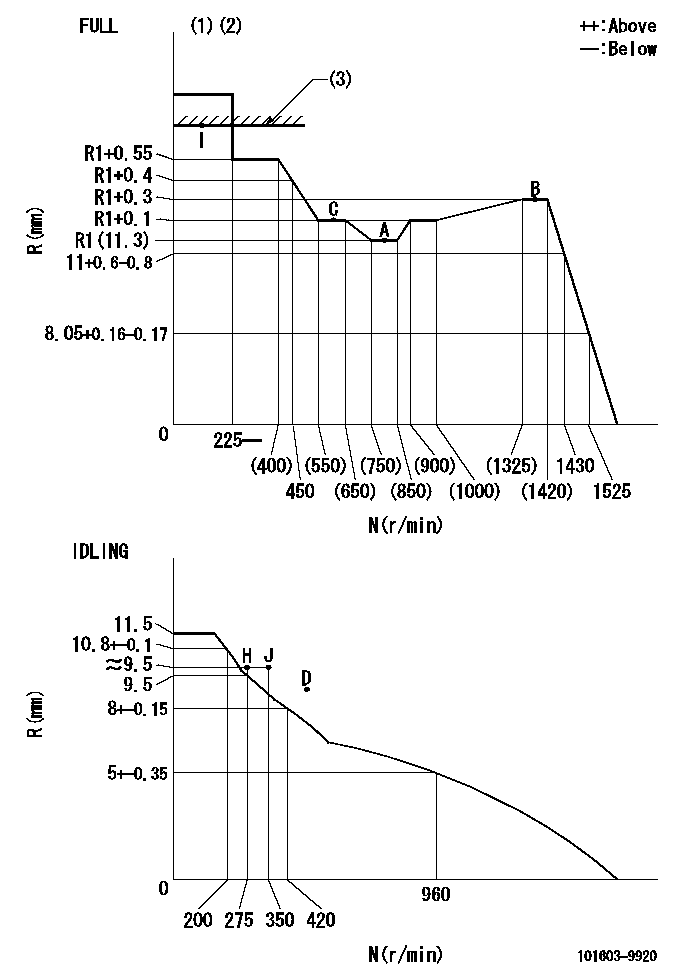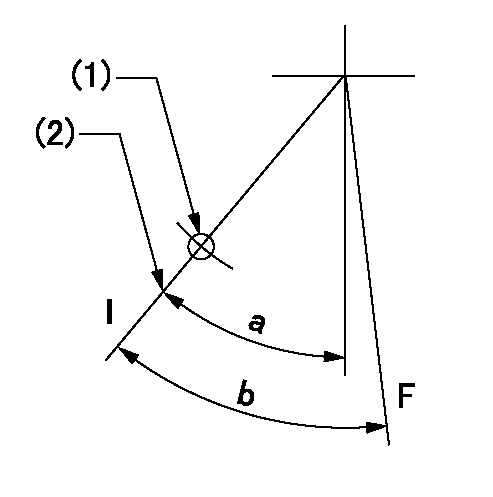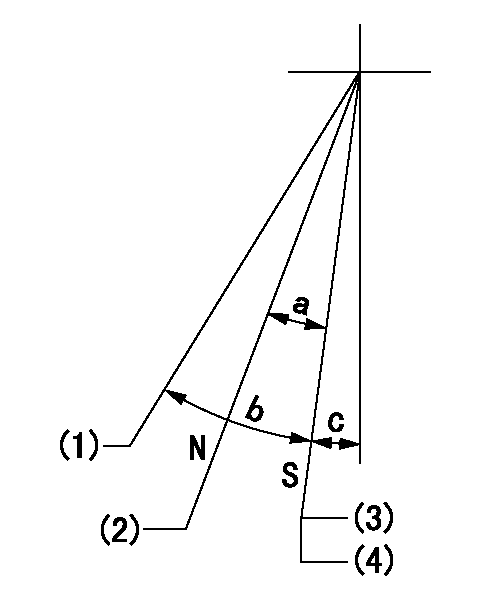Information injection-pump assembly
ZEXEL
101603-9920
1016039920

Rating:
Cross reference number
ZEXEL
101603-9920
1016039920
Zexel num
Bosch num
Firm num
Name
101603-9920
DPICO
INJECTION-PUMP ASSEMBLY
6D16 * Q
6D16 * Q
Calibration Data:
Adjustment conditions
Test oil
1404 Test oil ISO4113 or {SAEJ967d}
1404 Test oil ISO4113 or {SAEJ967d}
Test oil temperature
degC
40
40
45
Nozzle and nozzle holder
105780-8140
Bosch type code
EF8511/9A
Nozzle
105780-0000
Bosch type code
DN12SD12T
Nozzle holder
105780-2080
Bosch type code
EF8511/9
Opening pressure
MPa
17.2
Opening pressure
kgf/cm2
175
Injection pipe
Outer diameter - inner diameter - length (mm) mm 6-2-600
Outer diameter - inner diameter - length (mm) mm 6-2-600
Overflow valve
131424-5520
Overflow valve opening pressure
kPa
255
221
289
Overflow valve opening pressure
kgf/cm2
2.6
2.25
2.95
Tester oil delivery pressure
kPa
157
157
157
Tester oil delivery pressure
kgf/cm2
1.6
1.6
1.6
Direction of rotation (viewed from drive side)
Left L
Left L
Injection timing adjustment
Direction of rotation (viewed from drive side)
Left L
Left L
Injection order
1-5-3-6-
2-4
Pre-stroke
mm
3.3
3.25
3.35
Beginning of injection position
Governor side NO.1
Governor side NO.1
Difference between angles 1
Cal 1-5 deg. 60 59.5 60.5
Cal 1-5 deg. 60 59.5 60.5
Difference between angles 2
Cal 1-3 deg. 120 119.5 120.5
Cal 1-3 deg. 120 119.5 120.5
Difference between angles 3
Cal 1-6 deg. 180 179.5 180.5
Cal 1-6 deg. 180 179.5 180.5
Difference between angles 4
Cyl.1-2 deg. 240 239.5 240.5
Cyl.1-2 deg. 240 239.5 240.5
Difference between angles 5
Cal 1-4 deg. 300 299.5 300.5
Cal 1-4 deg. 300 299.5 300.5
Injection quantity adjustment
Adjusting point
-
Rack position
11.3
Pump speed
r/min
800
800
800
Each cylinder's injection qty
mm3/st.
59.8
58.3
61.3
Basic
*
Fixing the rack
*
Standard for adjustment of the maximum variation between cylinders
*
Injection quantity adjustment_02
Adjusting point
D
Rack position
8.7+-0.5
Pump speed
r/min
500
500
500
Each cylinder's injection qty
mm3/st.
7.6
6.5
8.7
Fixing the rack
*
Standard for adjustment of the maximum variation between cylinders
*
Injection quantity adjustment_03
Adjusting point
A
Rack position
R1(11.3)
Pump speed
r/min
800
800
800
Average injection quantity
mm3/st.
59.8
58.8
60.8
Basic
*
Fixing the lever
*
Injection quantity adjustment_04
Adjusting point
B
Rack position
R1+0.3
Pump speed
r/min
1375
1375
1375
Average injection quantity
mm3/st.
77.2
73.2
81.2
Fixing the lever
*
Injection quantity adjustment_05
Adjusting point
C
Rack position
R1+0.1
Pump speed
r/min
600
600
600
Average injection quantity
mm3/st.
48.5
44.5
52.5
Fixing the lever
*
Injection quantity adjustment_06
Adjusting point
I
Rack position
-
Pump speed
r/min
100
100
100
Average injection quantity
mm3/st.
73
63
83
Fixing the lever
*
Rack limit
*
Injection quantity adjustment_07
Adjusting point
H
Rack position
9.5+-0.5
Pump speed
r/min
275
275
275
Each cylinder's injection qty
mm3/st.
8.7
7.4
10
Fixing the rack
*
Remarks
(check)
(check)
Timer adjustment
Pump speed
r/min
1250--
Advance angle
deg.
0
0
0
Remarks
Start
Start
Timer adjustment_02
Pump speed
r/min
1200
Advance angle
deg.
0.8
Timer adjustment_03
Pump speed
r/min
1375
Remarks
Measure the actual advance angle.
Measure the actual advance angle.
Timer adjustment_04
Pump speed
r/min
-
Advance angle
deg.
5
5
5
Remarks
Speed, measure actual advance, end of effect
Speed, measure actual advance, end of effect
Test data Ex:
Governor adjustment

N:Pump speed
R:Rack position (mm)
(1)Torque cam stamping: T1
(2)Tolerance for racks not indicated: +-0.05mm.
(3)RACK LIMIT
----------
T1=G42
----------
----------
T1=G42
----------
Speed control lever angle

F:Full speed
I:Idle
(1)Use the hole at R = aa
(2)Stopper bolt set position 'H'
----------
aa=35mm
----------
a=33deg+-5deg b=(38deg)+-3deg
----------
aa=35mm
----------
a=33deg+-5deg b=(38deg)+-3deg
Stop lever angle

N:Engine manufacturer's normal use
S:Stop the pump.
(1)Free (at delivery)
(2)Rack position = approximately aa.
(3)Set the stopper bolt at speed = bb and rack position = cc (non-injection rack position). Confirm non-injection.
(4)After setting the stopper bolt, confirm non-injection at speed dd. Rack position = ee (non-injection rack position)
----------
aa=17.4mm bb=1375r/min cc=6.7-0.5mm dd=275r/min ee=(8.3)mm
----------
a=17deg+-5deg b=(27deg) c=2deg+-5deg
----------
aa=17.4mm bb=1375r/min cc=6.7-0.5mm dd=275r/min ee=(8.3)mm
----------
a=17deg+-5deg b=(27deg) c=2deg+-5deg
0000001501 MICRO SWITCH
Adjustment of the micro-switch
Adjust the bolt to obtain the following lever position when the micro-switch is ON.
(1)Speed N1
(2)Rack position Ra
----------
N1=400r/min Ra=9.2+-0.1mm
----------
----------
N1=400r/min Ra=9.2+-0.1mm
----------
Timing setting

(1)Pump vertical direction
(2)Position of timer's tooth at No 1 cylinder's beginning of injection
(3)B.T.D.C.: aa
(4)-
----------
aa=16deg
----------
a=(1deg)
----------
aa=16deg
----------
a=(1deg)
Information:
A measurement of fuel consumption is used to check fuel system performance. If fuel consumption of an engine is within the tolerance of specifications shown in the FUEL SETTING AND RELATED INFORMATION FICHE, the fuel system is performing correctly and no additional time should be spent checking fuel delivery.Fuel consumption - If the specified amount of fuel is being injected into the engine, the fuel delivery specification is being met. Therefore, the basic fuel system (fuel pump and lines, transfer pump, filters and primary fuel pressure) is within functional limits. Additional time spent troubleshooting these components is probably not justified.Fuel system timing - Fuel can not be burned efficiently if it is not injected into the cylinder at the correct time. Because engines only develop horsepower when they are running, timing must be measured when they are running. The pin timing of the engine is not adequate. Timing must be measured throughout the speed range (this also checks the timing advance operation).Intake manifold pressure - Manifold pressure is an indication of the overall health of the engine. Boost is affected by any one or all of the following: Fuel consumption, Compression (valve condition, piston ring condition), Turbocharger performance, Intake restriction (air filters), Exhaust restriction (muffler), or Timing.Recommended Procedure With Chassis Dynamometer
Possible Causes/Corrections
1. Check Records Used To Determine Fuel Consumption/Make sure the records are accurate. The minimum period for accurate fuel records is one month or 10,000 miles. Check the tires (air pressure and size), the gap between the tractor and trailer, air deflectors, trailer width, trailer type, engine cooling fan and driver habits. See OWNER/OPERATOR INPUT section for more information on the questions that should be asked.2. Minor Operating Faults/To help identify a problem before a more involved troubleshooting procedure is started, follow the procedure given in the PRIMARY ENGINE CHECKS section.3. Fuel Ratio Control Out of Adjustment or Bad/Follow the procedure in the Testing and Adjusting section of this Service Manual.4. Check Engine Performance/Do a Power Analysis Report (PAR), Level II, to check engine performance. See Special Instruction, Form No. SEHS8025 and SEHS7886 for the tooling and procedures to use. Be sure to make a record of the temperatures for inlet air, fuel (at filter base), lubricating oil and coolant. Also, check for excessive exhaust smoke. At this point, the governor fuel settings should be verified. See the Testing and Adjusting section of this Service Manual for the correct procedures to use. Also refer back to the information learned earlier (see OWNER/OPERATOR INPUT section) about truck specifications and application and judge whether or not the engine is performing as expected or customer expectation is realistic.5. Worn Fuel Nozzles/Check the horsepower on a dynamometer as in Step 4 above. Make a replacement of the fuel injection nozzles and check the horsepower output again. If there is more than 10 hp difference the old nozzles had eroded orifices and were causing high fuel rate. An alternate test is to lower the fuel setting to get the correct hp output.
Possible Causes/Corrections
1. Check Records Used To Determine Fuel Consumption/Make sure the records are accurate. The minimum period for accurate fuel records is one month or 10,000 miles. Check the tires (air pressure and size), the gap between the tractor and trailer, air deflectors, trailer width, trailer type, engine cooling fan and driver habits. See OWNER/OPERATOR INPUT section for more information on the questions that should be asked.2. Minor Operating Faults/To help identify a problem before a more involved troubleshooting procedure is started, follow the procedure given in the PRIMARY ENGINE CHECKS section.3. Fuel Ratio Control Out of Adjustment or Bad/Follow the procedure in the Testing and Adjusting section of this Service Manual.4. Check Engine Performance/Do a Power Analysis Report (PAR), Level II, to check engine performance. See Special Instruction, Form No. SEHS8025 and SEHS7886 for the tooling and procedures to use. Be sure to make a record of the temperatures for inlet air, fuel (at filter base), lubricating oil and coolant. Also, check for excessive exhaust smoke. At this point, the governor fuel settings should be verified. See the Testing and Adjusting section of this Service Manual for the correct procedures to use. Also refer back to the information learned earlier (see OWNER/OPERATOR INPUT section) about truck specifications and application and judge whether or not the engine is performing as expected or customer expectation is realistic.5. Worn Fuel Nozzles/Check the horsepower on a dynamometer as in Step 4 above. Make a replacement of the fuel injection nozzles and check the horsepower output again. If there is more than 10 hp difference the old nozzles had eroded orifices and were causing high fuel rate. An alternate test is to lower the fuel setting to get the correct hp output.
Have questions with 101603-9920?
Group cross 101603-9920 ZEXEL
Dpico
Nissan-Diesel
Dpico
101603-9920
INJECTION-PUMP ASSEMBLY
6D16
6D16